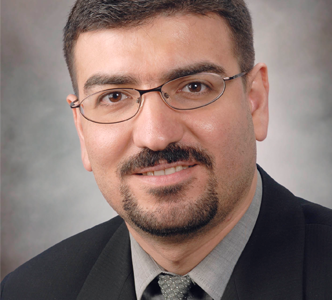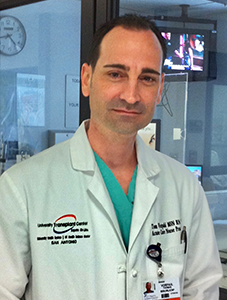UT Health’s Vascular and Interventional Radiology
The UT Health’s Vascular & Interventional Radiology section provides minimally invasive procedure services for San Antonio’s University Hospital and UT Medicine Systems; including imaging centers at University Hospital and Robert B. Green Clinic. Our section is composed of 7 board certified radiologists who have achieved additional subspecialized training through ACGME certified Vascular & Interventional Radiology fellowships. The section provides a wide range of minimally invasive procedures that can be performed as ambulatory outpatient visits or require just short observation admission periods, typically less than 24 hours. Some of the minimally invasive percutaneous procedures offered include:
Interventional Radiology Procedures
- Uterine Fibroid Embolization (UFE): a minimally invasive procedure highly effective in the treatment of symptoms from uterine fibroids.
- Prostate Artery Embolization (PAE): a cutting edge ambulatory procedure to treat the urinary symptoms from Benign Prostatic Hypertrophy.
- Vertebroplasty/Kyphoplasty: Fractures of the spine are very common in patients with osteoporosis, the loss of bone mass makes the vertebra susceptible to fractures with minimal or no trauma.
- Endovascular treatments for Peripheral Vascular Diseases (PVD): minimally invasive interventions that improve symptoms from arterial or venous circulation diseases.
- Percutaneous treatments of symptomatic cysts and vascular malformations (AVM’s).
- Tumor loco-regional treatments (ablation, chemoembolization, Y-90 radioembolization, etc): a wide variety of minimally invasive treatments options for a wide range of benign tumors and cancers (including liver, lung, kidney and localized metastasis from colorectal, breast and others)
- Biopsies: percutaneous image guided ambulatory procedures for diagnosis and staging of a variety of diseases.
- Drainages and stents: wide range of minimally invasive interventions aimed to relief obstructive diseases or drain abnormally retained fluid collections like abscesses or visceral leaks.
- Gastrostomy tubes and other enteral support drains: ambulatory procedures to aid in the management and relief symptoms from swallowing or visceral transit problems.
- Nephrostomy drains and urinary stents: minimally invasive procedures to treat urinary obstructive diseases or leaks.
- Advanced vascular access: ambulatory interventions to provide the adequate vascular access requirements for the medical management of multiple diseases including subcutaneous Port-catheter placements, a variety of tunneled subcutaneous vascular accesses and PICC lines.
- Hemodialysis access maintenance: minimally invasive ambulatory evaluation and treatment of failing hemodialysis fistulas and grafts to prolong their functionality.
- Peritoneal Dialysis (PD) catheter placement: minimally invasive placement of Peritoneal Dialysis drains.
- Hepatobiliary and Portal hypertension percutaneous interventions: wide range of minimally invasive procedures that diagnose and improve symptoms that result from liver disease.
Radiologists
Professor and Chief of Vascular and Interventional Radiology
Dr. Lopera completed his Medical School and Radiology Residency training in Medellin, Colombia. He completed two years of Interventional Radiology fellowship training at Louisiana State University in New Orleans. He is certified by the American Board of Radiology in Diagnostic Radiology and in Interventional Radiology. Dr. Lopera is a Fellow of the Society of Interventional Radiology. His main interests are the treatment of liver tumors, peripheral vascular interventions, treatment of Arterio-venous malformations (AVMs) and dialysis related interventions. Lopera@uthscsa.edu
Assistant Professor
Assistant Professor
Dr. Garza-Berlanga completed his Medical School and Radiology Residency training in Monterrey, Mexico. Then, he completed a two-year fellowship in Vascular and Interventional Radiology at RUSH University Medical Center in Chicago, Illinois. Dr. Garza-Berlanga joined UT Health San Antonio as faculty in 2011. He performs a wide range of minimally invasive procedures to treat Cancer and arterial, venous and liver diseases. His main interest is the treatment of tumors through percutaneous ablation and catheter-based techniques.
GarzaBerlang@uthscsa.edu
Associate Professor and Program Director, Interventional Radiology Residency Programs
Associate Program Director, Diagnostic Radiology Program
Dr. Kroma received his MD degree from Damascus University in Syria in 1994. He completed his residency in Diagnostic Radiology in 1997 at Damascus University. Dr. Kroma worked as a Diagnostic Radiologist in Syria and Saudi Arabia from 1997 to 2004. He then completed a Neuroradiology fellowship at Louisiana State University in 2005; followed by two years of Interventional Radiology fellowships at Louisiana State University and the University of Texas Health Science Center at San Antonio. He joined UT Health San Antonio as faculty in 2007. Dr. Kroma is certified by the American Board of Radiology for diagnostic radiology followed by a Certificate of Advanced Qualification in Vascular Interventional radiology (CAQ). His expertise include: Local treatment of liver cancers by radioembolization, chemoembolization and thermal ablation, local treatment of renal cancer by intra-arterial embolization and radiofrequency ablation, Uterine fibroid embolization, kyphoplasty and vertebroplasty , endovascular treatment of peripheral arterial disease, transjugular intrahepatic portosystemic shunts and balloon assisted obliteration of gastric varices, management of post liver and kidney tranasplantation complications, dialysis access maintenance, in addition to multiple percutaneous and endovascular procedures. Kroma@uthscsa.edu
Associate Professor of Radiology & Interventional Radiology
Program Director Diagnostic Radiology
Dr. Rohweder received his MD degree in 1990 from the University of Colorado. He completed Radiology Residency in 1996 at UT Health Sciences Center San Antonio. He was Board certified in Diagnostic Radiology 1996. Following Fellowship in 1997, he received certification of additional qualification (CAQ) in Vascular and Interventional Radiology in 1998 under Dr. Julio Palmaz and renewed in 2008. Dr. Rohweder was awarded the American Board of Radiology’s Certification in Interventional Radiology/Diagnostic Radiology in 2017, as a participant in the ABR Maintenance of Certification. His clinical expertise includes the full spectrum of Vascular and Interventional Radiology and General Diagnostic skills in all disciplines. After Fellowship, he went into private practice for 20 years working with groups in Midland, Texas, Colorado Springs, Colorado, and San Antonio. During private practice, he built and maintained a full spectrum Interventional Radiology practice while continuing general Radiology practice. He established a significant administrative experience in the hospital and outpatient clinic environments including Medical Director of Hospital Radiology departments, outpatient imaging centers, and Director of Interventional Radiology departments. He returned to UT Health San Antonio to pursue a desire to teach Radiology Residents and Fellows in 2017. Dr. Rohweder is also involved in medical legal consulting, reviewing and assisting in the defense of medical malpractice cases. RohwederK@uthscsa.edu
Professor and Vice Chair
Clinical Operations and Medical Director, University Hospital-Radiology
Dr. Suri received his M.D. degree from The Christian Medical College in India. He has completed residencies in diagnostic radiology at Cedars Sinai Medical Center in Los Angeles and at the Postgraduate Institute of Medical Education and Research in India. He completed a Cardiovascular and Abdominal Interventional Radiology Fellowship at the University of California Los Angeles. Dr. Suri is Board Certified by the American College of Radiology. His clinical interests include carotid artery stent placement, chemoembolization, infrainguinal arterial interventions, radiofrequency ablations, uterine fibroid embolizations, and transjugular intrahepatic portosystemic shunts. Suri@uthscsa.edu
Clinical Specialist-Acute Care Nurse Practitioner
Tom is a native of San Antonio and a veteran of the US Army Reserve. He earned his Diploma In professional nursing from the Baptist Health System school of Nursing in 1995 and went on to earn his Bachelor of Science in Nursing and his Master of Science in Nursing, both from UT health San Antonio. Before joining the Interventional Radiology team in 2018. Tom worked in hemodialysis, critical care, and transplant surgery. Vorpahl@uthscsa.edu
Assistant Professor
Associate Program Director, Diagnostic Radiology
Dr. John A. Walker, a native to Texas, completed his medical training with the UT School of Medicine at San Antonio. He then obtained a research doctorate in imaging here in the UT School of Biomedical Sciences while simultaneously training in our Diagnostic Radiology residency, leading to the completion of the prestigious ABR Holman Radiology Research Pathway. He then completed a fellowship in our Vascular and Interventional Radiology Program. Upon completion of his training, Dr. Walker joined our UT faculty in 2016. He remains interested in regenerative medicine and perfusion imaging research. He performs a wide range of minimally invasive procedures with extensive training in liver interventions that include loco-regional cancer treatments, porto-systemic shunt creation and management, bile duct disease and post-transplant management. He has experience treating uterine fibroids, female pain related to pelvic congestion, similarly male varicoceles, and is trained in a multitude of venous and arterial interventions to include dialysis access issues. For an extensive list of procedures that may be performed by an interventional radiologist with explanations see the patient’s section at Society of Interventional Radiology website (http://www.sirweb.org/patients/).
Contact Information:
Jessica Esquivel
VIR Administrative Support
Phone: 210-567-5564
Fax: 210-567-4194
Email: EsquivelJ2@uthscsa.edu








